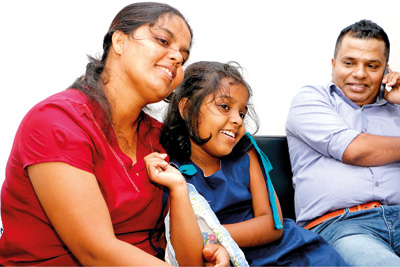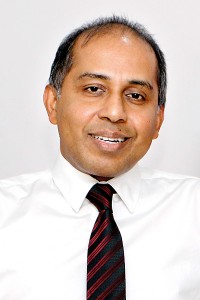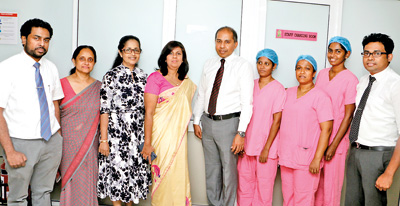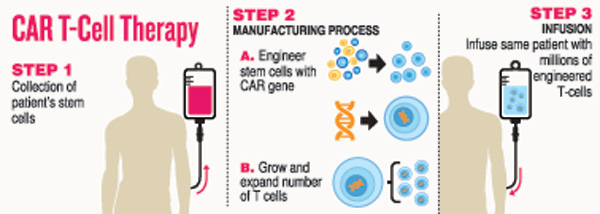News
Brand new therapy against blood cancer gives fresh lease of life to nine-year-old
A beaming family of three sits before us on Thursday morning in Colombo before heading back home to Kaluwila, Hidogama in Anuradhapura.

Beaming Hemamali, Samadi and Amarajeewa. Pix by Priyankara Samaraweera
Pretty nine-year-old Samadi Sathsarani between mother H. Rasika Hemamali and father P.T. Amarajeewa is all smiles – pulled back from the brink of death by a brand new procedure to beat leukaemia.
Samadi is the flag-bearer, for not only is CAR T-cell Therapy a first in Sri Lanka but it has also not been introduced in other countries in the region such as India, Pakistan or Bangladesh to name a few.
As CAR T-cell Therapy (Chimeric Antigen Receptors T-cell Therapy) is highly specialized, personalized treatment it is available only at a limited number of centres across the world. In this region, it is available in Singapore, Malaysia and China, the Sunday Times understands.
We chat to the family before looking into what this therapy involving Chimeric Antigen Receptors performed at the Bone Marrow Transplant (BMT) Unit of the Nawaloka Hospital, Colombo, headed by Consultant Oncologist Dr. Wasantha Rathnayake is all about.
As Samadi murmurs that when she grows up she wants to be like the “Miss Aunties” (the dedicated nurses of the unit who have looked after her) and concedes that she enjoys quarrelling with her two older brothers whom she loves dearly, her parents recall the terrible leukaemia saga they have been grappling with since Samadi was just three years old.

Dr. Wasantha Rathnayake
It began with complaints from their little girl that her legs were hurting. At the Anuradhapura Teaching Hospital she was diagnosed with leukaemia and the treatment began at the National Cancer Institute, Maharagama.
Three chemotherapy cycles after, “honda wuna” (she recovered), says Amarajeewa, while Hemamali interjects that Samadi even went to school for about 1½ years.
The danger signals appeared again in December 2017, says Hemamali, with konde and papuwe kekkuma (back and chest pain).
The hospital rounds started again – Anuradhapura and then Maharagama with mother and daughter coming all the way, while the father and sons managed on their own back home.
A bone marrow test gave the tragic news that the leukaemia had caught Samadi in its vice-like grip again……. “Devani varatath avith kiyala,” says Hemamali.
The next treatment, of course, for Samadi was a bone marrow transplant in June 2018 at the Nawaloka Hospital, which was successful.
But the family’s happiness over beating this illness did not last long. By September 2018, the cancerous cells had invaded Samadi’s brain and it was then that Dr. Rathnayake suggested CAR T-cell Therapy.
Admitted to the state-of-the-art BMT Unit at Nawaloka Hospital on January 1, Samadi underwent the procedure on January 7 and returned home on January 12.

Dr. Wasantha Rathnayake (at centre) is flanked (from the left of the pic) by Dr. Pradeep Fernando; Dr. Samanmali Gunasekara; Dr. Lakmali Morawaka; Dr. Nilukshi Perera; Sr. H.D.D.C.P. Jayathunga; Sister-in-Charge H.R.A.D. Yashodari; Nursing Officer N.U. Kariyawasam; and Medical Officer Dr. Roshan Wijewardena who met the Sunday Times on Thursday
“We hear that usually it costs about Rs. 65 million in other countries but we spent only around Rs. 7.5 million,” says Amarajeewa, as he and Hemamali with much emotion talks of the major efforts and kindness of the BMT Unit team and the strong support extended by Alliance Insurance, Ms. Dulani Weerakoone and many at the Primary Industries Ministry with the catalysts being Watawala, Kumara and Priyantha.
As Samadi pays obeisance to Dr. Rathnayake, he gently taps her head and urges her not to touch the floor and the family leaves for home in Kaluwila.
Nawaloka’s BMT team working under the guidance of the Deputy General Manager Prof. Lal Chandrasena includes Consultant Oncologist & Director Dr. Wasantha Rathnayake; Consultant Paediatrician & Co-Director Dr. Deepal Perera; Consultant Transfusion Physician & Co-Director Dr. Lakmali Morawaka; Consultant Haematologist & Director Dr. Nilukshi Perera; Consultant Microbiologist Dr. Samanmali Gunasekara; Medical Officer & Coordinator Dr. Pradeep Fernando; and Nursing Coordinator & Sister-in-Charge H.R.A.D. Yashodari and their own teams.

| Dr. Wasantha Rathnayake explains what CAR T-cell Therapy is | |
| Explaining how the procedure was done, Consultant Oncologist Dr. Wasantha Rathnayake says a sample of Samadi’s stem cells was collected from her blood in Sri Lanka and genetically-engineered in a Chinese laboratory to target and attack the cancerous cells by modifying them to produce special structures called Chimeric Antigen Receptors (CARs). CARs are proteins that allow the T-cells to identify an antigen (a toxin or foreign substance) in the targeted tumour cells, it is learnt. Just before these genetically-engineered cells were transfused back into Samadi’s blood, all her T cells were destroyed through chemotherapy to be replaced by the new cells. “This is a form of immunotherapy,” says Dr. Rathnayake, adding that stem cells are special human cells that have the ability to develop into any other cell type from muscle cells to brain cells. In this case, the stem cells developed into T-cells. T cells – which have a receptor on the cell surface – area type of lymphocyte which plays an important role in the immune response. The immune response is how a person’s body recognizes and defends itself against bacteria, viruses and substances that appear foreign and harmful, he points out. This therapy is usually given to B-cell leukaemia patients who have relapsed and also patients with B-cell lymphomas or mediastinal B-cell lymphomas who have relapsed, says Dr. Rathnayake, stressing that the advantage of this therapy is that the patient’s immunity is not compromised. There are also no major side-effects, only the flu-like cytokine release syndrome which can be managed and treated, he adds. |

